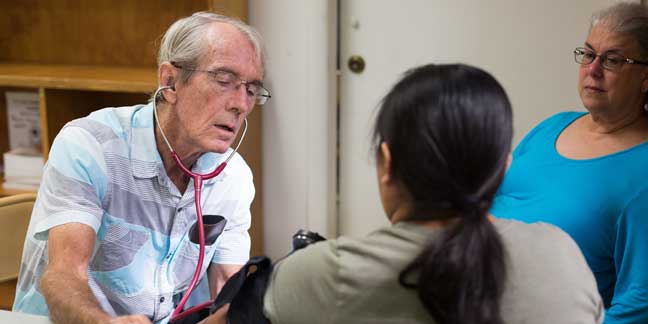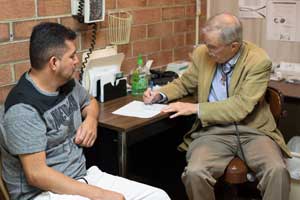 Dispensing care and compassion at Newton clinic
Dispensing care and compassion at Newton clinic
NEWTON — At 9 a.m. every Saturday without fail, the doors open at St. Joseph Church’s parish hall, welcoming dozens of people waiting in line there to receive medical treatment. There to greet them is a dedicated group of volunteers who see it as their calling from God to provide free medical care to the neediest among us.
St. Joseph Clinic is a social justice initiative that sprang from an idea 20 years ago involving community leader Miguel Caraballo as well as parishioner Dr. Doug Miller to serve the ever-growing Hispanic population in the Catawba Valley, a population often without insurance coverage. Each Saturday a faith formation classroom is converted into a makeshift doctor’s office, where Miller and others provide free basic health care.
Caraballo, Miller and the other volunteers who work with them agree that they feel called to use their particular skills – whether it is their medical training, translation skills, or whatever – to help people in need, and that God motivates them in their work.
Caraballo, ethnically Hispanic himself and active in the local Latino community, noted decades ago that the heart of Catawba County had a need for health care assistance. He responded to God’s call, says Miller, who joined with Caraballo establish the weekly ritual of mercy in medicine known as St. Joseph Clinic.
St. Joseph Clinic helps those in the services sector and blue-collar industries – people who work long weekday hours for little pay – by providing quality care on their generally work-free Saturday mornings, Miller says.
Though the clinic offers general health care services for free, Miller notes that a $5 donation to the clinic is accepted and “helps (a patient’s) esteem.” True mercy, to him, is not simply showing sympathy, but also enabling the needy to have a sense of self-respect.
Father Jim Collins, pastor of St. Joseph Church, says he has seen firsthand how many of the clinic’s recipients live in poverty or dire socioeconomic circumstances, and he supported Caraballo and Miller’s work when he became pastor in Newton.
 Both Caraballo and Miller have families, and giving up their Saturday mornings means making a sacrifice of time and presence, but they refer to Luke 6:38, which says, “Give, and it will be given to you.”
Both Caraballo and Miller have families, and giving up their Saturday mornings means making a sacrifice of time and presence, but they refer to Luke 6:38, which says, “Give, and it will be given to you.”
“Anyone who sacrifices (something) doesn’t go unnoticed (by God),” Miller says. Spending time at the clinic every Saturday means less time spent with his wife Karen, 12 children and numerous grandchildren, but, he says, “(God has been) generous to us, and when you give, you are rewarded!”
In the end, both Miller and Caraballo say they knew God had called them to serve the others in need, others whom God had also created as equal human beings, others who needed mercy shown to them. Consequently, Miller and Caraballo, with the support of the local volunteers like Spanish translator Carmen Morales and nurse Jeanne Gerhardt of Hickory, as well as endorsement of the parish, began a journey to heal the heart of Catawba County – one Saturday morning and one patient at a time. It has been aided by Wal-Mart’s pharmacy, which offers common medications for aliments at a low cost.
Now, 20 years later, the clinic continues to succeed. In 2015 the North Carolina Medical Board honored St. Joseph Clinic for its decades of service to the poor.
But to Caraballo and Miller, the “thank yous” they receive from grateful patients every Saturday morning seem like God’s way of speaking through the patients to say “thank you for glorifying me through your service.”
— Aaron Kohrs, Special to the Catholic News Herald. Kohrs is a member of St. Aloysius Church in Hickory and a student at University College Cork in Ireland, where he is nearly finished with a master’s degree in international relations.


